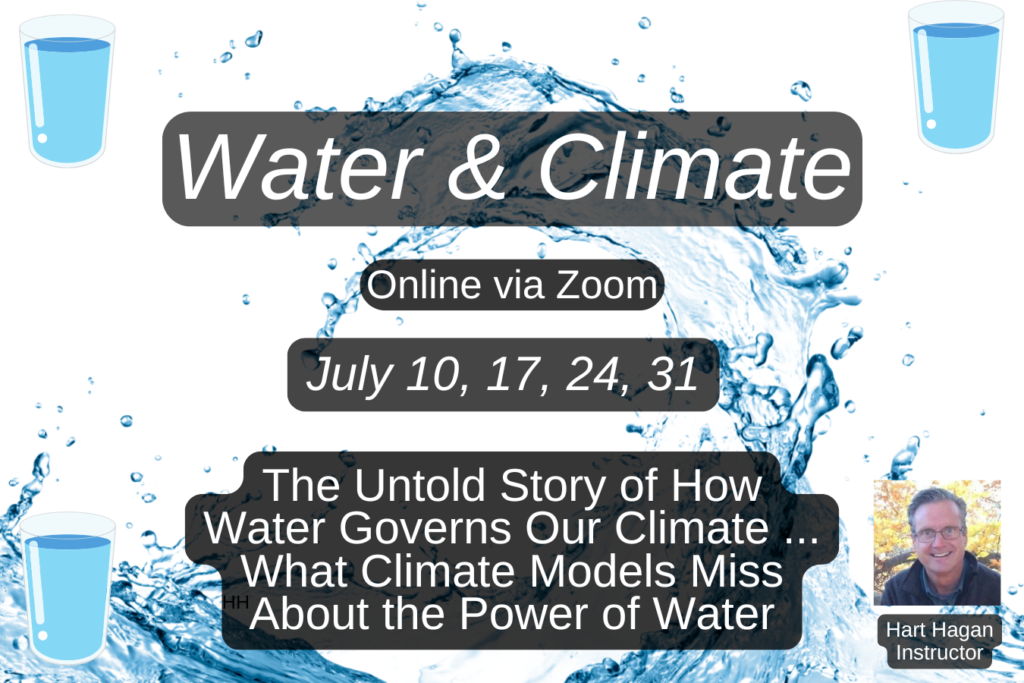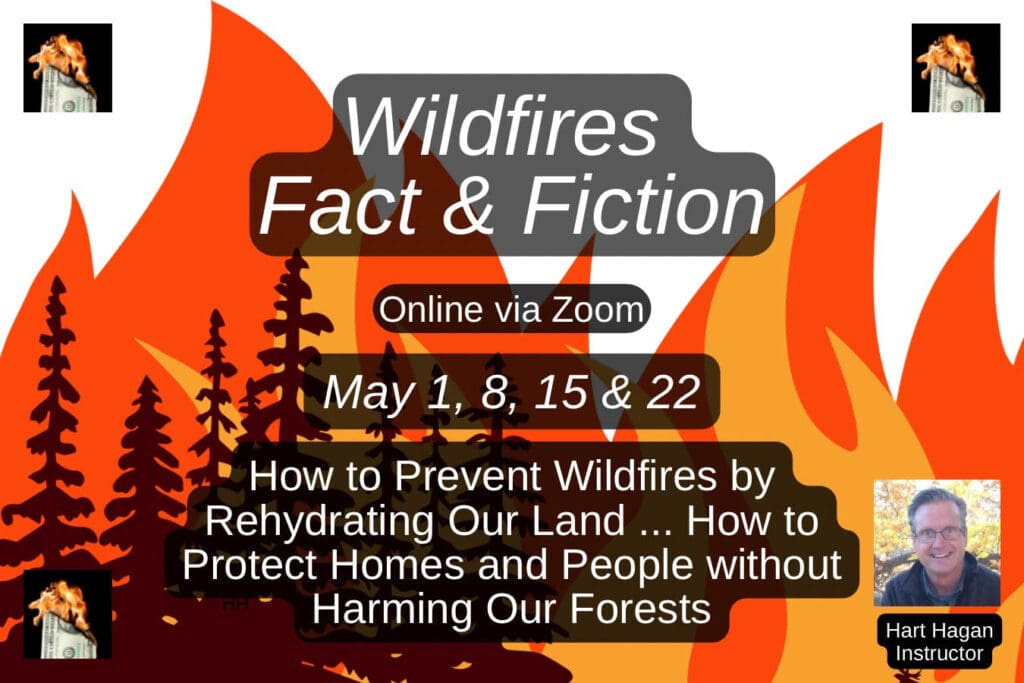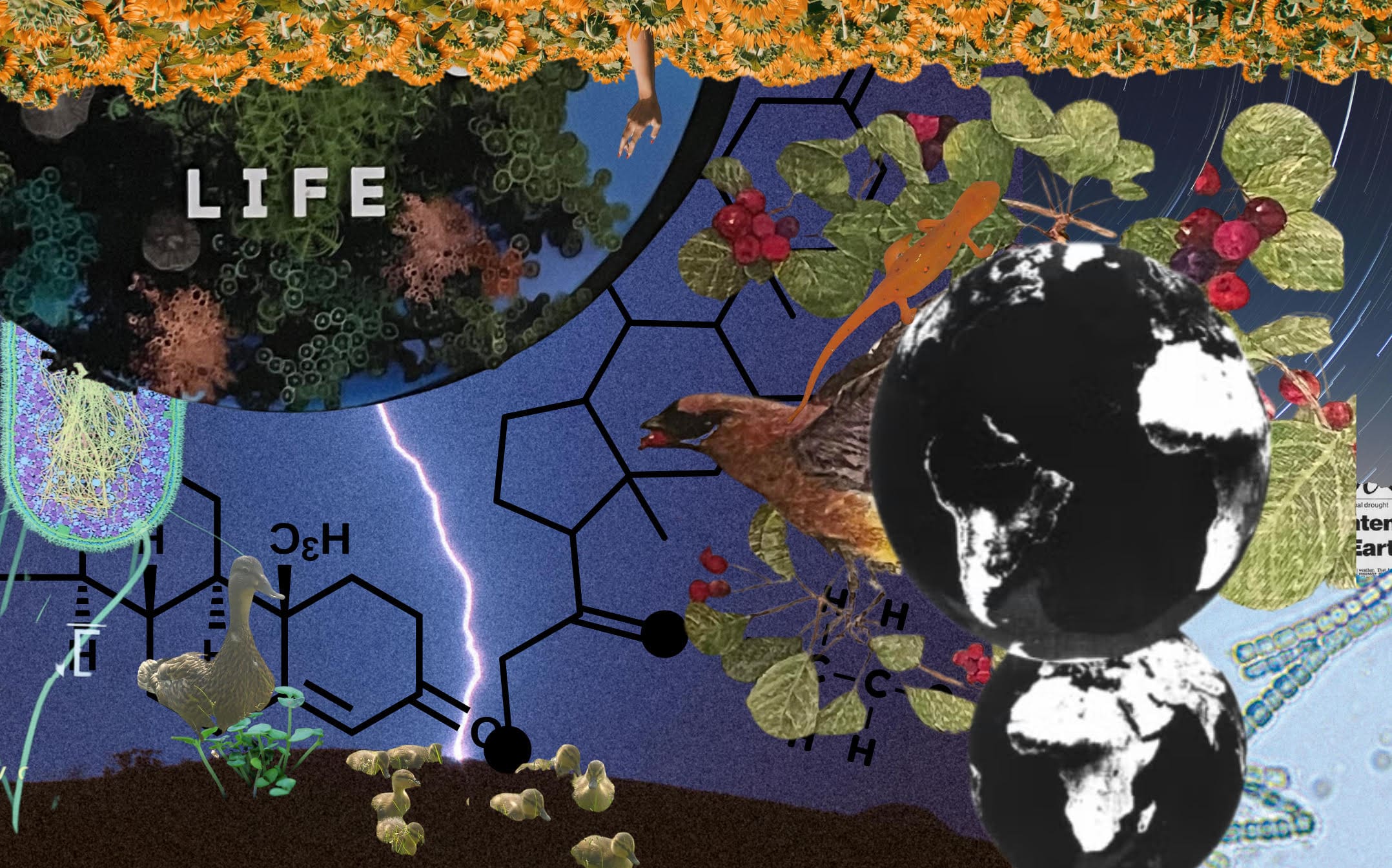After hosting a successful series of courses on Biodiversity and Symbiosis with staff scientist and restoration ecologist Jim Laurie, we at Biodiversity for a Livable Climate have recognized the need for a larger curriculum on ecosystem restoration, nature-based solutions to climate change, and the transformations required for our civilization to navigate the challenges ahead of us.
Explore our course offerings below, and stay tuned for more courses to be announced!
Summer 2025
Water—The Missing Climate Solution
July 10 – 31, 2025

What if there’s a powerful solution we’ve been overlooking—one that could actually help cool the planet, starting right where you live?
The untold story begins with water.
Water is the most overlooked climate regulator. Through the cycling of water—plants, clouds, grasslands, wetlands and forests help stabilize Earth’s temperatures. When these systems are healthy, they cool the planet. But clear-cutting, tilling, development and other destructive land management practices have dismantled these natural cooling mechanisms.
We can bring these powerful cooling systems back to life. Join us for Water & Climate: The Untold Story of How Water Governs Our Climate; What Climate Models Miss About the Power of Water.
This illuminating course reveals how nature manages heat through water—and shows you how to reactivate nature’s cooling systems by restoring the water cycle, locally and globally.
Don’t miss it—Sign up today!
Spring/Summer 2025
Wildfires Fact & Fiction: How to Prevent Wildfires by Rehydrating Our Land with Hart Hagan;
How to Protect Homes and People Without Harming Our Forests
May 1 – 22, 2025

Wildfires are a very real threat, and we should be prepared. Unfortunately, we have been sold a range of false solutions (e.g., fuel reduction, forest thinning and prescribed burns), all at taxpayer expense.
Wildfires Fact & Fiction will equip you with the most essential knowledge to protect homes and communities, while giving our forests what they really need, which is to be naturally rehydrated and nurtured as ecosystems. Discover how thriving ecosystems, including beaver ponds, help protect communities from wildfires, and learn actionable solutions that could reshape wildfire prevention policies.
Join us for Wildfires Fact & Fiction: How to Prevent Wildfires by Rehydrating Our Land; How to Protect Homes and People Without Harming Our Forests. This engaging 4-week course runs Thursdays on May 1, 8, 15 & 22, live on Zoom.
Spring 2025
Biodiversity 12: Earth Alive – Exploring Our Home with Jim Laurie
February 26 – May 14, 2025

“Earth Alive – Exploring Our Home” will be the twelfth biodiversity course taught by our Restoration Biologist & Futurist Jim Laurie.
Earth is a living miracle in our corner of the Universe, full of symbiotic connections which cover the lands and oceans with a wide array of diverse ecosystems. We will be exploring how plants and wetlands create the atmosphere and rainfall. How did the grasslands co-evolve with huge grazing animals to build a deep rich soil sponge? How do fungi and microbes work together to mine the rock for life creating minerals like phosphorus, magnesium, and iron?
Humans have been very successful on this planet and we are learning so much about these intelligent living processes, but our rapid transformation of the Earth is creating a crisis for many species including ourselves. How can we deal with wildfires, heat domes, and increasingly powerful hurricanes? Can we solve the plastics pollution problem including PFAS?
You will meet many veterans of our Symbiosis Team and share thoughts in our breakout sessions. If this is your first course, you will make new friends and the team members will help you catch up. The only requirement is curiosity and a desire to learn.
Winter/Spring 2025
Food & Farming with Hart Hagan
Join Hart Hagan for this 8 week course on Food & Farming from February 6 – March 27, 2025. Classes are on Thursdays and you can attend at either 12 noon or 7 pm ET.
Much of the impact of farming today is increasing carbon emissions in the atmosphere and contributing to flooding and drought in our communities. The majority of current farming practices are also causing detrimental effects to our water, wildlife, health and economy.
As citizens, consumers and gardeners, how can we influence a shift in farming to build healthier soils that pull carbon down out of the atmosphere, produce nutrient-dense foods and build the “soil sponge,” strengthening food security and climate resilience in our communities? Read more and register now.
Winter 2024/2025
Trees & Forests with Hart Hagan
Join Hart Hagan for this 8 week course on Trees & Forests from December 5, 2024 – January 30, 2025. Classes are on Thursdays and you can attend at either 12 noon or 7 pm ET.
Forests are more important than most of us realize. Forests make rain, cool the temperature, and send moisture to regions around the world.
In many cases, forests have become monoculture “tree plantations” for the timber industry, lacking biodiversity and moisture. In a biodiverse forest, the soil soaks up water like a sponge, preventing wildfires, drought, and providing an abundance of food, water and shelter for a myriad of microbes, insects, birds, mammals and amphibians. Read more and register now.
Summer 2024
Healing Our Land & Our Climate! with Hart Hagan
Join Hart Hagan for this 12 week course on Healing Our Land & Our Climate! from July 9 – September 24. Classes are on Tuesdays and you can attend at either 12 noon or 7 pm ET.
In order to heal our climate, we must FIRST heal our land. In order to heal the land, we must restore the health of the soil and our ecosystems. During this course, we will explore the power of healthy soil and ecosystems to prevent flooding, drought, wildfires, and extreme heat, remove carbon from the atmosphere, and deliver nutrients to our plants, making them healthy, resilient and nutritious. Read more and register now.
Spring 2024
An Economics of Love with Fred Jennings
This 12-week course meets every Monday, starting April 15, 2024 and running through July 8, 2024. There will be a free introductory session on Monday, April 8, 2024. Sessions will be held from 12 – 1pm ET on Zoom.
Join us as we explore and discuss the consequences of a serious error built into the foundations of economics that is directly responsible for a great deal of ethical, cultural and ecological damage in our world. Discover a new pathway through an economics of love, or what we will learn to understand as an economics of complementarity, abundance and consilience. Read more and register now.
Biodiversity 10 Deep Dive: Beavers, Wetlands & Shorelines with Jim Laurie
This 12-week course meets every Wednesday, starting February 21 and running through May 8, 2024. Sessions will be held from 12 – 2pm ET and 7 – 9pm ET on Zoom to accommodate students’ schedules.
Join us for a deep dive into wetlands, shorelines, the water cycle, and the solutions powered by a systems approach to climate.
Are you ready to transform your understanding of how life on the planet works and how we can play a role? Join us as we follow the transformation of two leading writers and thinkers to a deeper understanding of natural systems, our role, and the ability of nature to cool the planet. Register now to claim your seat.
Fall 2023
A New Climate Story with Christopher Haines
This 6-week course meets every Monday, starting November 13 and running through December 18, 2023. Sessions will be held from 1 – 2pm ET and 7 – 8pm ET on Zoom to accommodate students’ schedules.
This course investigates the consequences of regenerative land management with sessions on soils, forests, and water.
Imagine a world where innovative thinking and peer-reviewed science offers hope and empowerment, with a path to reverse climate change in months, years or decades, not centuries. Imagine principles you could apply to improve your own circumstances, even if the rest of the world fails to act. As triple-digit temperatures warp summers, there is no better time to consider a new perspective.
Biodiversity 9: Transformation to a Holistic Perspective – Nature Can Cool the Planet with Jim Laurie
This 12-week course meets every Wednesday, starting September 20 and running through December 13, 2023. Sessions will be held from 12 – 2pm ET and 7 – 9pm ET on Zoom to accommodate students’ schedules.
Join us for a deep dive into the science, history, and cultural connections of holistic thinking and a systems approach to climate.
Spring 2023
Sustainability and Humankind’s Dilemma: Life on a Tough New Planet with Nancy Lee Wood
This is a 6 week course that meets every Friday, starting April 21 and running through May 26, 2023. Sessions will be held from 12 – 2pm ET on Zoom.
Approached from a Social Science perspective, this 6-week course provides a broad overview of the multiple crises confronting humankind: climate change, peak oil, resource depletions, ecological deterioration, and societal collapse. It focuses on the current dilemmas in which humankind finds itself; how we have arrived at this moment; the resulting psycho-social-economic impacts; and several socio-economic-ecological regenerative strategies for mitigation.
Ecological Economics 2: Finding Our Way to a New Understanding with Fred Jennings
This 8 week course meets every Monday, starting April 3 and running through May 22, 2023. Sessions will be held from 12 – 2pm ET on Zoom.
Join us for an 8-week excursion into our economic culture and why it is doing us so much harm. You will emerge from this course with a far more robust understanding of how to think about social systems and to design them to work better for all of us. The course will open you up to a far less dismal economics than you might expect!
Biodiversity 8 Deepdive: Symbiosis is Challenging Survival of the Fittest with Jim Laurie
This 12 week course meets every Wednesday, starting March 1 and running through May 12, 2023. Sessions will be held from 12 – 2pm ET and 7 – 9pm ET on Zoom to accommodate students’ schedules.
Join us for a deep dive into the science, history, and cultural implications of how we understand evolution and interspecies relationships.
Biodiversity 8 Deepdive will explore recent discoveries in biology and the ancient wisdom of Indigenous observers in an effort to identify these better metaphors and weave together a more hopeful vision of the future than “survival of the fittest.” For example, the microbiome in our human gut was not appreciated until early in this century. Now we are finding that trees and mycorrhizal fungi work together in healthy soils to create a subsurface microbiome. Must multicellular organisms like plants, animals, and fungi nurture healthy microbiomes to ensure their own survival? Let’s find out.
Fall 2022
Biodiversity 7: Rewilding Half the Earth to Create A Future We Want with Jim Laurie
Beginning Wednesday, October 12, 2022, the course meets for two hours at 12pm and 7pm ET every Wednesday, to accommodate multiple time zones. Read more and register here!
In Biodiversity 7: ReWilding Half the Earth to Create a Future We Want, Jim Laurie will lead students in examining restorative possibilities such as protecting half the earth, creating mini-forests using the Miyawaki method, and increasing wetlands.
Summer 2022
Biodiversity 6: Systems Thinking & Scenarios – Tools for Creating Better Ecological Futures with Jim Laurie
Beginning Wednesday, June 22, 2022, the course meets for two hours at 12pm and 7pm ET every Wednesday, to accommodate multiple time zones. Read more and register here!
In Biodiversity 6: Systems Thinking & Scenarios – Tools for Creating Better Ecological Futures, Jim Laurie will lead students in taking on the question, “could humans be a global force for the reemergence of healthy ecosystems on a much faster timeline?” To answer this question, the course will look at systems thinking and scenario-writing as tools for examining the “Whole” and finding out what possibilities exist for the future.
Spring 2022
Heat Planet: Restore Ecosystems – Restore Climate with Christopher Haines
Beginning Wednesday, May 4, 2022, the course meets for two hours at 9am and 7pm ET every Wednesday, to accommodate multiple time zones. It will run for six weeks until June 8.
In Heat Planet, Christopher Haines will lead students on an exploration of the sources of heat and climate disruption, and the ways that local action can significantly improve local climates. He will shift away from the dominant paradigm focusing on the re-radiation of heat by greenhouse gases to the ways that our cultivation (or degradation) of the living surface of the planet can manage (or create) heat. The course will empower us to take on the cooling and re-greening actions necessary to rebalance local and regional, and eventually global climate.
Social Solutions: Making Systems More Resilient with Fred Jennings
Beginning Monday, April 4, 2022, the course meets from 12 – 1 pm ET every Monday and Thursday. It will run until June 30, with a break on Memorial Day (Monday, May 30).
In Social Solutions, Dr. Fred Jennings will focus on developing a working group of people who are ready to engage in ecological economics and to address social problems creatively and intelligently. Students will develop their practical analytical skills by examining our failing democratic processes and our fisheries management systems.
Horizonal Thinking: Toward a New Economics with Fred Jennings
Beginning Monday, April 4, 2022, the course meets from 1 – 2 pm ET every Monday and Thursday. It will run until June 30, with a break on Memorial Day (Monday, May 30).
In Horizonal Thinking, Dr. Fred Jennings will guide students in an exploration of planning horizons, explaining his approach to an ecological economics based on favoring collaboration over competition. Students will examine why and how our society has evolved toward the destruction of our ecological life-support systems, and how we might change our economic culture to protect ourselves against this destruction.
Ego VS Eco: How Human, Animal, and Planet Health Interconnect with Tania Roa
Beginning Wednesday, March 2, 2022, the course meets for an hour and a half each week for 8 weeks (with one week’s break in the middle).
Tania Roa, MSc in Animals and Public Policy and advocate for wildlife and intersectional environmentalism, will lead students on an exploration of the connections between human, animal, and planet health.
Fall 2021
An Introduction to Ecological Economics with Fred Jennings
Fred Jennings, our Ecological Economist, led students into an exploration of the ecological foundations for economics and the economic mechanisms that can support healthy ecological function.
Biodiversity 5: Cooling the Climate by Mastering the Carbon Cycle with Jim Laurie
In this fifth course in the Biodiversity and Symbiosis series, Jim Laurie and the team of budding planetary restorers took on the challenge of maximizing photosynthesis in forests, grasslands, and oceans. We explored how this powerful process can rebalance the carbon cycle and work to cool the climate.
